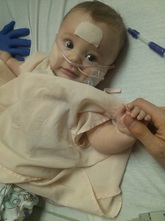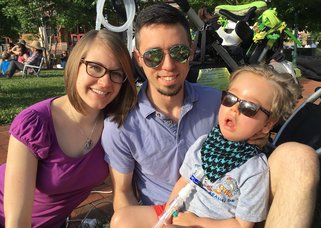Max's Story

Max was born at the beginning of August of 2013, weighing in at a healthy nine pounds, two ounces. After a two day stay in the hospital, we went home and began our happy new life as a family of three.
Over the next few weeks, we noticed that Max seemed to have trouble lifting his head. "Tummy time" (prescribed by doctors for all babies nowadays) was his least favorite activity; he would simply lie face down and cry. At a local nursing mothers group, Kristen saw other babies weeks younger than Max already holding their heads up and looking around. We brought these concerns up to our doctor. Since Max was a pretty big baby, we decided to give him a little time to see if he would "catch up."
At Max's two month checkup, he still wasn't lifting his head, so his pediatrician decided to refer us to a pediatric neurologist at Children's National Medical Center. A few tests and a few weeks later, we went to the main Children's hospital in DC to get the results of Max's genetic testing. The test said that Max has a genetic disease called Spinal Muscular Atrophy. This is a condition in which a missing gene (SMN1) causes an absence of the survival motor neuron (SMN) protein which is essential for the development of the muscular nervous system. A lack of SMN manifests itself in myotonia (low muscle tone, which we had already seen in Max) as well as difficulty with basic functions like breathing and eating. When SMA is diagnosed in infants less than six months old, it is classified Type I and is considered terminal. The doctors told us that 50% of children diagnosed with SMA Type I make it to age 2. There is as of yet no known cure.
Over the next few weeks, we noticed that Max seemed to have trouble lifting his head. "Tummy time" (prescribed by doctors for all babies nowadays) was his least favorite activity; he would simply lie face down and cry. At a local nursing mothers group, Kristen saw other babies weeks younger than Max already holding their heads up and looking around. We brought these concerns up to our doctor. Since Max was a pretty big baby, we decided to give him a little time to see if he would "catch up."
At Max's two month checkup, he still wasn't lifting his head, so his pediatrician decided to refer us to a pediatric neurologist at Children's National Medical Center. A few tests and a few weeks later, we went to the main Children's hospital in DC to get the results of Max's genetic testing. The test said that Max has a genetic disease called Spinal Muscular Atrophy. This is a condition in which a missing gene (SMN1) causes an absence of the survival motor neuron (SMN) protein which is essential for the development of the muscular nervous system. A lack of SMN manifests itself in myotonia (low muscle tone, which we had already seen in Max) as well as difficulty with basic functions like breathing and eating. When SMA is diagnosed in infants less than six months old, it is classified Type I and is considered terminal. The doctors told us that 50% of children diagnosed with SMA Type I make it to age 2. There is as of yet no known cure.

This hit us pretty hard. Along with hoping and praying for Max's healing, we began reorienting our lives to meet this new reality: learning lots of new information; sharing this news with our family, friends, and community; supporting and loving each other; grieving the loss of certain expectations we all naturally have for our children; processing practical ramifications for work and schedules and basic life stuff; and deriving strength and inspiration from the many researchers who are working to cure this disease and the men, women, and children who live with SMA.
Our parents were deeply saddened to hear this news about their grandson but have been a huge support to us. Meanwhile, Max continues to be the same joyful little baby he's always been. Neither his sensory nervous system nor his cognitive functions are affected by the condition (meaning he can feel things fine and will continue to develop cognitively like the bright little guy he is).
Our parents were deeply saddened to hear this news about their grandson but have been a huge support to us. Meanwhile, Max continues to be the same joyful little baby he's always been. Neither his sensory nervous system nor his cognitive functions are affected by the condition (meaning he can feel things fine and will continue to develop cognitively like the bright little guy he is).

Having a neuromuscular condition makes Max highly susceptible to respiratory infections (i.e. cold, flu, pneumonia). We experienced this firsthand the weekend before Thanksgiving '13 when Max came down with a cold that put him--and us with him--in the pediatric ICU for over six weeks. Respiratory complications during this stay prompted our decision to give Max a tracheostomy so that he can have the support of a ventilator. Despite the difficulty of the situation, we were so very grateful that we were able to be together and that Max was getting what he needed from the wonderful team at Children's National Medical Center (in Washington, D.C.).
We are doing our best to enjoy each day with Max to the fullest. We appreciate the many continued prayers for Max's healing and for our peace and strength. Please feel free to share this site with anyone you know who might want to keep up with Max's progress. We are hoping for a breakthrough--that a way will be provided for Max's body to produce the protein he needs to sustain and grow his muscular nervous system--and we are thrilled to see treatments for this previously untreatable disease just starting to emerge. At the same time, we have learned what it means to be grateful for today and to trust the Source of Life.
Wish you could do something to help? We know the feeling! Click here to learn about ways to help.
We are doing our best to enjoy each day with Max to the fullest. We appreciate the many continued prayers for Max's healing and for our peace and strength. Please feel free to share this site with anyone you know who might want to keep up with Max's progress. We are hoping for a breakthrough--that a way will be provided for Max's body to produce the protein he needs to sustain and grow his muscular nervous system--and we are thrilled to see treatments for this previously untreatable disease just starting to emerge. At the same time, we have learned what it means to be grateful for today and to trust the Source of Life.
Wish you could do something to help? We know the feeling! Click here to learn about ways to help.
